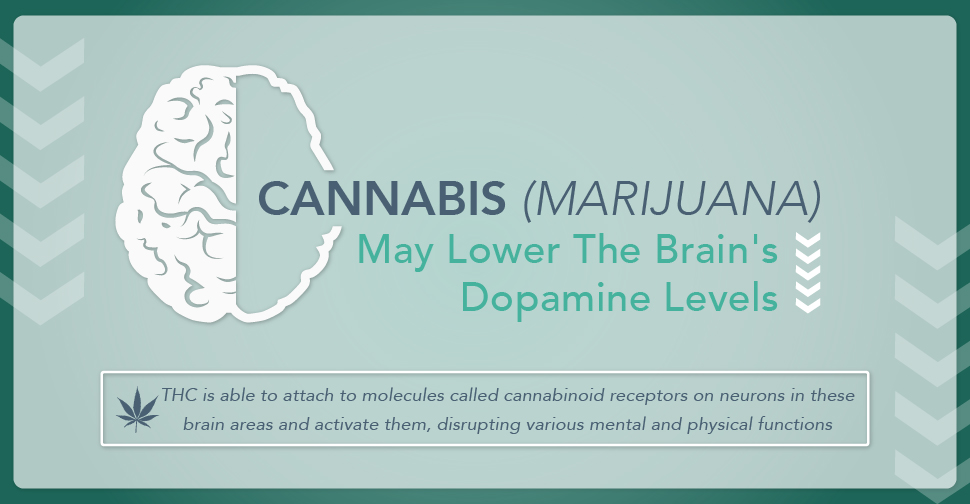
The National Institute on Drug Abuse (NIDA) reports that the 2014 National Survey on Drug Use and Health found marijuana to be “the most commonly used illicit drug (22.2 million past-month users).” For many recreational users, there is yet a persistent and ill-informed mindset that marijuana use is safe and carries little to no risk. Recent research increasingly shows that this is in fact false—using marijuana does carry an array of risks and health concerns that should be weighed against the purported benefits.
This past March, a study published in the journal Molecular Psychiatry portrayed yet another dimension of the detriment this drug has on a user’s health, findings that support the growing body of research illustrating how marijuana use can actually alter the brain’s chemistry.
What The Study Found
The study sought to determine if cannabis dependence was at all associated with a dopamine deficit, which as the study’s authors noted, results from most other drug abuse. Researchers compared eleven “severely cannabis-dependent participants” against twelve healthy controls. Participants did not have any comorbid conditions, including nicotine use, that could influence the findings. The research was directed at the striatum—a region of the brain that Medical News Today (MNT) explained as being responsible for “memory, impulsive behavior and attention,” functions that are all theorized to be affected by cannabis use.
MNT covered the researcher’s procedures, which included administering an oral amphetamine to induce a dopamine release. This change was monitored by a positron emission tomography (PET) scan that tracked “a radiotracing molecule that binds to the brain’s dopamine receptors.” According to their summation, the study showed that those who used the drug had a lower level of dopamine release. NIDA summed up these findings, stating that “lower dopamine release within the striatum was associated with greater emotional withdrawal and inattention in marijuana-dependent participants.”
Lastly, MNT reported that while across the board, those who had a lower dopamine release had lower levels of performance related to the cognitive functions specific to learning and working memory tasks, there was no markable difference between the two study groups in this respect.
The Mechanisms By Which Marijuana Affects The Brain
The human body relies on neurotransmitters to send chemical messages and communicate important information within the brain. Certain chemical components within cannabis called cannabinoids, including THC, are similar in nature to those cannabinoids that naturally occur within the human brain, including one called anandamide.
According to NIDA, this likeness allows an impact on the “brain areas that influence pleasure, memory, thinking, concentration, movement, coordination, and sensory and time perception,” because the “THC is able to attach to molecules called cannabinoid receptors on neurons in these brain areas and activate them, disrupting various mental and physical functions and causing the effects described earlier.”
NIDA reports that THC:
- Is able to alter the functioning of the hippocampus… and orbitofrontal cortex, brain areas that enable a person to form new memories and shift their attentional focus. As a result, using marijuana causes impaired thinking and interferes with a user’s ability to learn and to perform complicated tasks.
- Disrupts functioning of the cerebellum and basal ganglia, brain areas that regulate balance, posture, coordination and reaction time.
What Harm Occurs From Marijuana Use and Abuse?
Marijuana or cannabis use disorder can cause dependence, and in worst cases, addiction. This occurs because the brain becomes so accustomed to the substitution of the marijuana’s cannabinoid compounds in place of its own and decreases its own production of those that naturally occur within our bodies. While some of these endocannabinoid neurotransmitters are yet naturally produced, the brain is no longer stimulated properly by them.
Not everyone experiences a euphoric state from using marijuana. NIDA notes that in opposition to the feelings that people typically seek by using marijuana, it can sometimes cause “anxiety, fear, distrust, or panic… people who have taken large doses of marijuana may experience an acute psychosis, which includes hallucinations, delusions, and a loss of the sense of personal identity.” They also estimate that of those who use marijuana, 30 percent suffer from marijuana use disorder.
As marijuana can impair your judgement, coordination, and reaction time, use may result in significant dangers that arise from making poor choices. These may include unsafe sexual practices, trying other drugs, or operating a vehicle while under the influence and endangering your life or that of those around you. Recent studies also suggest that prolonged use of cannabis, especially that which begins during adolescence, can actually decrease your IQ.
It is important when looking at your use or abuse, that you consider the full impact of what you are doing. Despite the fact that cannabis use may offer some seemingly therapeutic benefits, you are still endangering your physical and mental health by using it.
Protect Your Brain And Make An Educated Decision Today
 If you’re considering using marijuana for therapeutic purposes, but are fearful of the side effects or risks associated with it, or if your use is becoming consistent with a marijuana use disorder, please don’t wait any longer to get the information you need to make an informed decision today. Our staff at Drugrehab.org is highly trained and committed to helping you get the best answers and information that exists today. Contact us today, we are here to help you.
If you’re considering using marijuana for therapeutic purposes, but are fearful of the side effects or risks associated with it, or if your use is becoming consistent with a marijuana use disorder, please don’t wait any longer to get the information you need to make an informed decision today. Our staff at Drugrehab.org is highly trained and committed to helping you get the best answers and information that exists today. Contact us today, we are here to help you.

